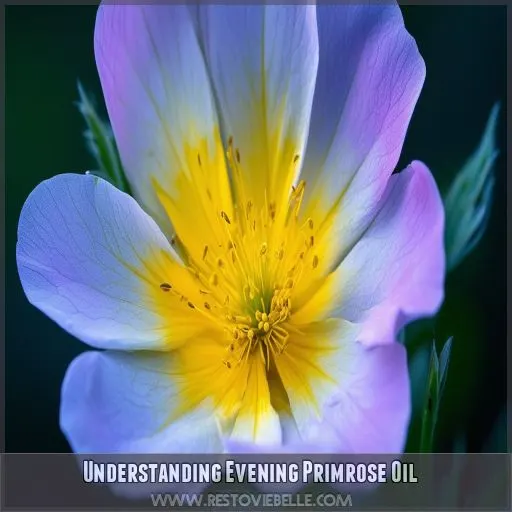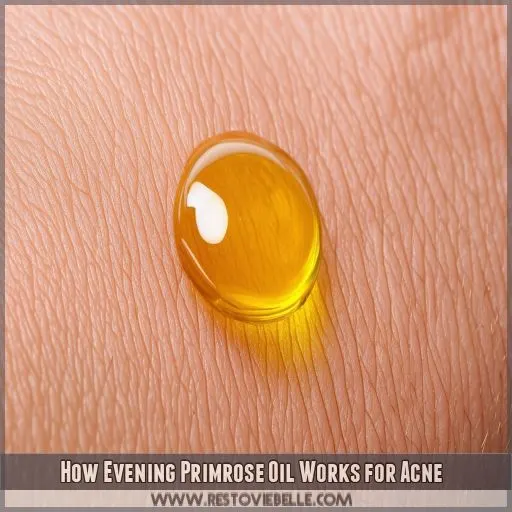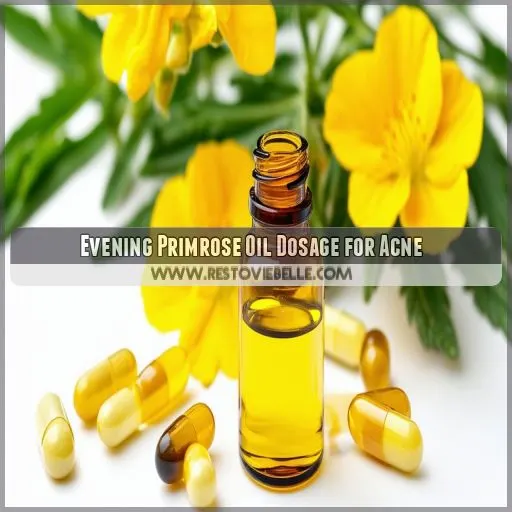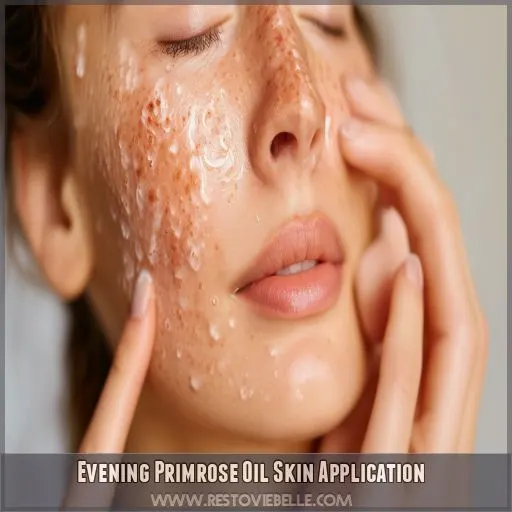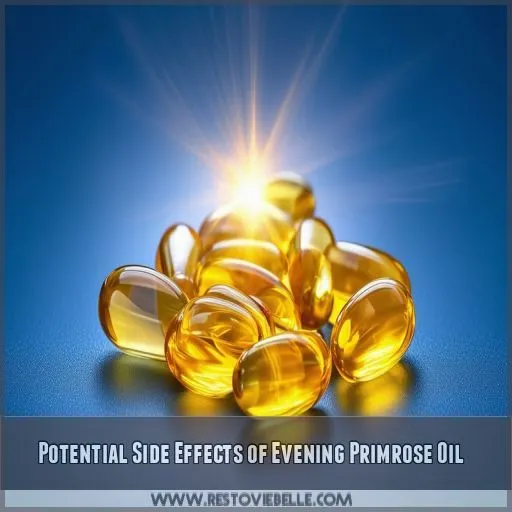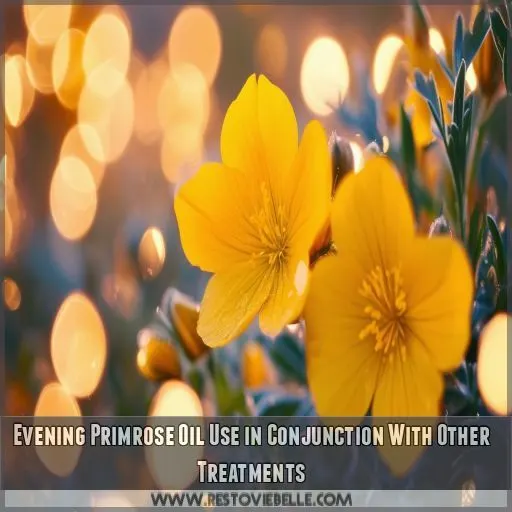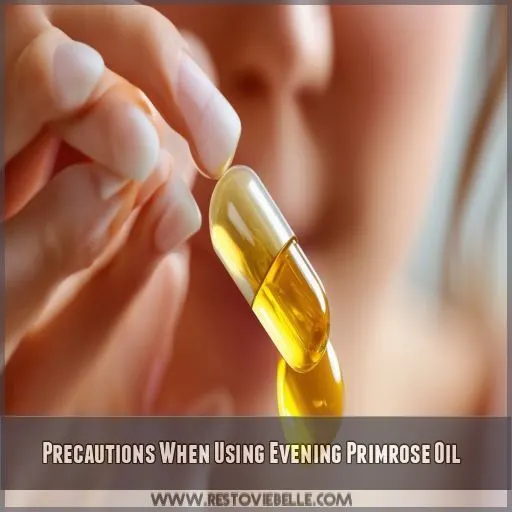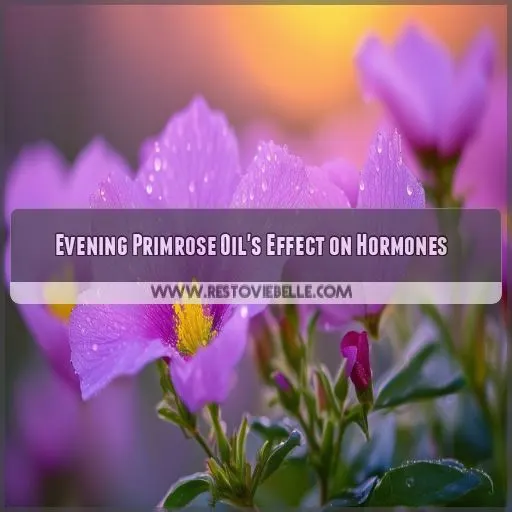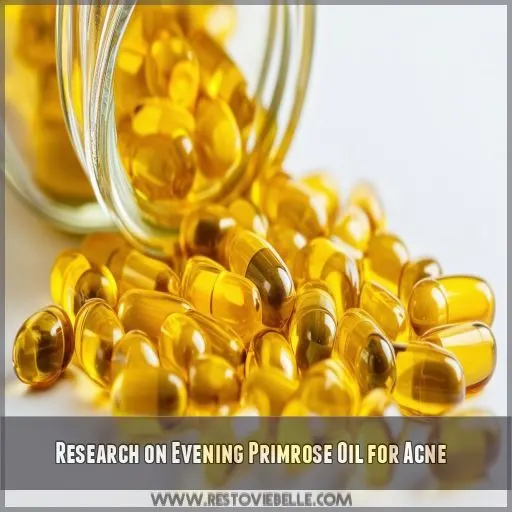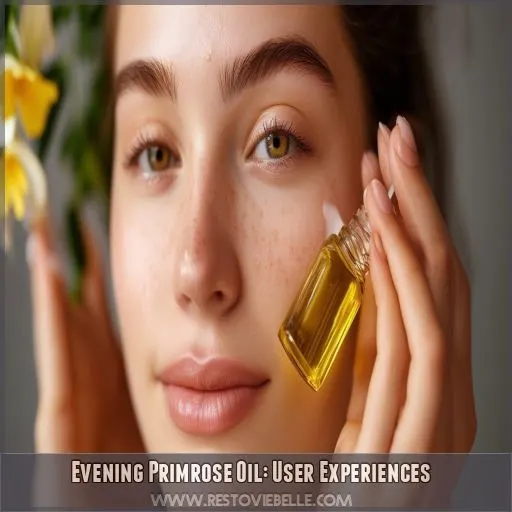This site is supported by our readers. We may earn a commission, at no cost to you, if you purchase through links.
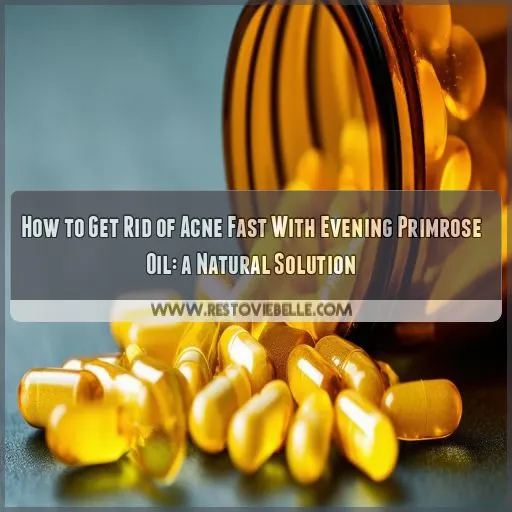 Acne ailing you? Seeking some natural solutions? Evening primrose oil is the new light at the end of your tunnel.
Acne ailing you? Seeking some natural solutions? Evening primrose oil is the new light at the end of your tunnel.
This article contains information on how to get rid of acne fast using evening primrose oil, a miracle cure that nature might have provided us with. In this post, you’ll learn about its properties, usage methods, and the benefits it can bring to your skin.
We’ll examine dosage recommendations, possible side effects, and its interaction with other treatments. Knowing how evening primrose oil works will help you in decision-making while including it in your skincare routine.
Now, let’s discuss this promising natural approach to acne management.
Table Of Contents
- Key Takeaways
- How to Get Rid of Acne Fast With Evening Primrose Oil?
- Understanding Evening Primrose Oil
- How Evening Primrose Oil Works for Acne
- Evening Primrose Oil Dosage for Acne
- Evening Primrose Oil Skin Application
- Potential Side Effects of Evening Primrose Oil
- Evening Primrose Oil Use in Conjunction With Other Treatments
- Precautions When Using Evening Primrose Oil
- Evening Primrose Oil’s Effect on Hormones
- Research on Evening Primrose Oil for Acne
- Evening Primrose Oil: User Experiences
- Frequently Asked Questions (FAQs)
- Can evening primrose oil clear pimples?
- How long does it take for evening primrose oil to work?
- How long does it take evening primrose oil to balance hormones?
- How to use evening primrose oil on face?
- How quickly can I expect results from evening primrose oil?
- Can evening primrose oil worsen acne initially?
- Is evening primrose oil effective for hormonal acne?
- Can men use evening primrose oil for acne treatment?
- Does evening primrose oil help with acne scars?
- Conclusion
Key Takeaways
- Evening primrose oil might be your skin’s new BFF, packed with gamma-linolenic acid that could help tame those pesky pimples. Just don’t expect it to work miracles overnight – good things come to those who wait!
- Start small and work your way up with dosage, like dipping your toes in the pool before diving in. A typical dose ranges from 500mg to 1300mg per day, but always chat with your doc first to avoid any unwanted surprises.
- Mixing a few drops of evening primrose oil with your favorite carrier oil (jojoba or coconut, anyone?) and massaging it onto your face could be just the spa night your skin’s been craving. Leave it on overnight and wake up to potentially calmer, happier skin.
- While evening primrose oil might be nature’s little helper for some, it’s not a one-size-fits-all solution. Keep an eye out for any side effects, and remember – what works for your bestie might not work for you. It’s all about finding your skin’s perfect dance partner!
How to Get Rid of Acne Fast With Evening Primrose Oil?
To get rid of acne fast with evening primrose oil, you’ll need to be consistent and patient.
Start by taking oral supplements, typically 1-3 capsules of 450mg daily. For topical use, mix the oil with a carrier like jojoba and apply to clean skin overnight.
Evening primrose oil’s anti-inflammatory properties and essential fatty acids can help reduce acne and improve skin health. However, it’s not a miracle cure – results may take weeks to appear.
Be cautious of side effects, especially if you’re on medication or pregnant. Always consult your doctor before starting any new treatment.
If you’re curious about maximizing its benefits, there’s more to explore about this natural acne-fighting solution.
Understanding Evening Primrose Oil
Evening primrose oil is derived from the evening primrose plant and has recently received attention for all its positive effects on health, including treatment against acne. As a nutritional supplement, it contains gamolenic acid—a type of fatty acid considered very effective in many skin conditions.
For using evening primrose oil to treat acne vulgaris, knowledge about proper dosage along with associated risks should be maintained. Indeed, while this may have beneficial effects in some ways, it’s no magic bullet.
Also be aware that evening primrose oil can interact with some medications, so use it with caution and consult your doctor, especially in the case of isotretinoin or other acne treatments. The other thing is the safety regarding pregnancy, wherein it isn’t recommended for pregnant mothers.
Keep in mind, too, that everybody’s skin is different—what works on one may not work on another. And don’t forget to always start with small dosages and look out for your skin’s response.
How Evening Primrose Oil Works for Acne
Now that you know what evening primrose oil is, let’s discuss how it works against acne. The natural alternative does show some promise in fighting those unsightly breakouts. Here’s how:
• Reduces inflammation: Anti-inflammatory properties help to soothe red, angry spots
- Skin barrier improvement: Strengthens your skin’s protective layer, potentially preventing future breakouts
Lipid profile balancing: It may help to regulate sebum production and minimize oily skin.
• Nutrition Boost: Provides essential fatty acids for skin health.
Though there’s less evidence relating to the efficacy of evening primrose oil in acne, it’s found to improve certain biochemical parameters related to skin health in some research studies. Evening primrose Oil supplementation can increase aminotransferase levels and elevate the activity of transaminases; further research studies are required to confirm the same. Similar to other natural remedies, results may vary and aren’t a one-size-fits-all promise. Consult with a dermatologist before application.
Evening Primrose Oil Dosage for Acne
Now that you know how evening primrose oil Works for Acne, let’s discuss dosage recommendations. Finding the optimal intake level may prove a little tricky since this differs from one individual to another. The capsule sizes usually range between 500mg and 1300mg. According to some studies, one is allowed to take up to 3 capsules of 450mg daily for the treatment of acne. However, it’s essential to start at a lower dosage and gradually increase the amount because some side effects are possible.
When comparing different products, choose those which have more gamma-linolenic acid—since that’s the active ingredient. Cost analysis: although evening primrose oil isn’t exactly the cheapest, still its cost is generally within affordable limits for most people for long-term use. Dosage seems to have an effect on lipid parameters, so you may want to monitor your levels if concerned.
Now, bind. For spot treatment, you’ll apply the oil directly to problem areas. We’ll get into that in more detail next.
Evening Primrose Oil Skin Application
To apply evening primrose oil topically for acne, you’ll want to follow these steps:
- Cleanse your face thoroughly with a gentle, non-irritating cleanser.
- Mix a few drops of evening primrose oil with a carrier oil like jojoba or coconut oil.
- Gently massage the mixture into your skin, focusing on acne-prone areas.
- Leave it on overnight or for at least 30 minutes before rinsing.
Potential Side Effects of Evening Primrose Oil
Though very effective for the control of acne, evening primrose oil does come with some side effects. You may end up going through minor issues like a headache or stomach upset. More grave safety concerns include a heightened risk of bleeding, especially when under blood thinners. Here is an overview of key points to consider:
| Concern | Risk Level | Precaution |
|---|---|---|
| Headaches | Low | Monitor and adjust dosage |
| Upset stomach | Low | Take with food |
| Bleeding risk | Moderate | Avoid if on anticoagulants |
One more important issue is drug interactions. Evening primrose oil interferes with certain medications, like antidepressants and blood pressure drugs. Connected to this, it’s very important to consult your doctor before use to avoid any risks on health or medication interference. If you plan to undergo surgery, stop taking it at least two weeks in advance to prevent bleeding complications. Remember that natural doesn’t always mean risk-free, so stay informed and protect yourself from these possibilities of potential harm.
Evening Primrose Oil Use in Conjunction With Other Treatments
While evening primrose oil may be adequate by itself, you might get better benefits when using it in combination with other acne treatments. You still have to be careful of interactions between oils when combining remedies. If, for instance, you’re treating your skin with benzoyl peroxide or salicylic acid, apply the evening primrose oil at a time of day when it can’t interact with these products.
In addition, there are dietary considerations; a good diet complements the topical treatments. Evening primrose oil works more variably depending on how bad your acne is or what type of patient you are. For people with hormonal acne, some possible hormonal effects of this oil might be more potentially useful.
Just remember, some things work on some but not others. Always consult a dermatologist before using evening primrose oil with another skincare product. This is particularly true for those taking prescription medications.
Precautions When Using Evening Primrose Oil
While evening primrose oil might be really effective in acne treatment, the administration is associated with some risks.
You must avoid Evening Primrose if you’re pregnant or are looking to get pregnant since it increases the risk of complications. Also, those people suffering from seizures must avoid evening primrose oil since its intake would lower the seizure threshold. Evening primrose may further increase the possibility of bleeding when you’re under blood thinners.
You should always consult your doctor whenever you want to start taking a new supplement, more so when you’re taking some medications that may have interactions with the ingredients from the plant.
Some minor side effects include headaches and stomach upset. On the safe side, you should always conduct a patch test before applying evening primrose oil on your face.
Keep in mind that natural doesn’t necessarily mean harmless, so be careful and aware when using this remedy.
Evening Primrose Oil’s Effect on Hormones
Evening primrose oil also affects hormones and may have an effect on acne. You’ll learn that this natural oil has the ability to impact your body’s estrogen metabolism and prostaglandin synthesis. These are the same pathways toward keeping good hormonal balance, which in most cases is tied to acne breakouts.
By keeping healthy levels of estrogen, evening primrose oil can potentially reduce the occurrences of acne flare-ups induced by hormonal problems. This could also be the case for regulating prostaglandin production, which may reduce some of the inflammation incurred by acne.
Note, however, that individual hormonal effects may vary from person to person. While this oil worked miraculously for some women who wanted to purify their skin, it just wouldn’t do so for others.
If you’re trying evening primrose oil for hormonal benefits, consult a healthcare professional first. They can help you understand how it might interact with your unique hormonal profile and existing treatments.
Research on Evening Primrose Oil for Acne
Research into the use of evening primrose oil for acne is still in its early stages, although some studies conducted do hold significant promise. While more stringent trials are called for, current findings do seem to hold out hope for potential benefits. Here’s everything you need to know:
- Safety studies have proven that evening primrose oil is well tolerated in the short term.
- The effects of long-term use aren’t well researched, so caution is advisable.
- Assimilation rates from dietary intake and skin absorption vary, hence dosage recommendations.
- Variable dosages make optimal amounts hard to pin down across studies.
Research is underway to see how evening primrose oil can be useful in acne treatment by helping reduce inflammation and bring balance to hormones. Note that results may vary from person to person; therefore, if you’re considering using evening primrose oil for acne, it would be imperative to consult first with a health professional who can give you all the details on proper dosing and other possible drug interactions or treatment alterations.
Evening Primrose Oil: User Experiences
As for Evening Primrose Oil for Acne, experiences are different from user to user. Many people reported good results with it, while others didn’t change anything. Here’s a breakdown of common benefits which most users experienced:
| Benefit | Timeframe | Frequency | Satisfaction |
|---|---|---|---|
| Reduced inflammation | 2-4 weeks | Often | High |
| Skin texture improvement | 4-8 weeks | Not often | Moderate |
| Less oily skin | 2-6 weeks | Occasionally | Mixed |
| Less breakouts | 4-12 wks | Varies | Mixed |
Others use evening primrose oil and swear it’s their ace in the hole against acne that just won’t quit. Others will shrug and say, "Meh, didn’t do much for me." Keep in mind: your mileage may vary. What works for your best friend may not work at all for you. It’s kind of like finding the perfect pair of jeans: sometimes you gotta try a few before you find your match. Always consult with a dermatologist before diving in.
Frequently Asked Questions (FAQs)
Can evening primrose oil clear pimples?
While evening primrose oil may help reduce inflammation, there’s limited evidence it can clear pimples quickly. It might complement your acne-fighting routine, but don’t rely on it as a standalone solution. Consult a dermatologist for personalized advice.
How long does it take for evening primrose oil to work?
Like planting a seed, evening primrose oil’s effects unfold gradually. You’ll typically notice improvements in 4-6 weeks. Be patient and consistent with your usage. Results may vary, so monitor your skin’s response carefully.
How long does it take evening primrose oil to balance hormones?
It typically takes 2-3 months for evening primrose oil to potentially balance hormones. You’ll need patience and consistency. Remember, results vary, and it’s not a guaranteed fix. Always consult your doctor before starting any new supplement regimen.
How to use evening primrose oil on face?
Like a gentle rain nourishing parched soil, apply evening primrose oil to your face. Cleanse, then massage a few drops onto damp skin. Use nightly for best results. Don’t forget to patch test first!
How quickly can I expect results from evening primrose oil?
Results from evening primrose oil can vary. You might notice improvements in 4-6 weeks, but it’s not a quick fix. Consistency is key. Remember, everyone’s skin is different, so patience is essential for potential benefits.
Can evening primrose oil worsen acne initially?
Evening primrose oil typically doesn’t worsen acne initially. However, you might experience a temporary "purging" effect as your skin adjusts. This is rare and usually subsides quickly. If you’re concerned, start with a patch test.
Is evening primrose oil effective for hormonal acne?
Evening primrose oil may help with hormonal acne due to its anti-inflammatory properties and gamma-linolenic acid content. While some users report benefits, scientific evidence is limited. It’s best to consult a dermatologist for personalized treatment options.
Can men use evening primrose oil for acne treatment?
You’ll be amazed at the results! Men can absolutely use evening primrose oil for acne treatment. It’s not gender-specific and may help reduce inflammation and improve skin health. Always consult a doctor before starting any new treatment.
Does evening primrose oil help with acne scars?
While evening primrose oil may help with inflammation, there’s limited evidence for its effectiveness on acne scars. It’s not a proven treatment, but you can try applying it topically or taking supplements. Consult your dermatologist for better options.
Conclusion
Sarah, a 25-year-old battling persistent acne, found relief with evening primrose oil. While it’s not a miracle cure, this natural solution shows promise in managing acne.
As you’ve learned, evening primrose oil can be a valuable addition to your skincare routine. Remember to consult your doctor before use, especially if you’re on other treatments.
With proper dosage and application, you might find that evening primrose oil helps you manage acne effectively. Always prioritize safety and be patient as you explore this natural approach to clearer skin.
